Like the title of this newsletter, Earth's surface is mostly water, but it's not uniformly distributed. Earth's surface can be divided into two hemispheres, one containing most of the land, and the other most of the water. New Zealand is near the center of the water hemisphere, while our home in the Pacific Northwest is just off the edge. Our flight of 7,000 miles, then, just over a quarter of the earth's circumference, from Seattle to Auckland with a stop in Honolulu was almost entirely over water. Water has a way of showing up in my travel essays.
We're here in New Zealand for the Ironman 70.3 World Championships, which I'll be writing about next week. We’re staying on until the beginning of the new year; I plan to write weekly dispatches for you while we’re here. To ensure accommodation for the race we started planning the trip early, before we really had our heads around it. This, with the discombobulated nature of the last year, caused so many unforced errors in our planning that I'm amazed we made it at all. Thanks to good luck and the kindness of strangers, we did.
After a round-trip shuttle ride to the wrong airport hotel in Honolulu (unforced error #1) we finally make it to the right one and take an Uber to Waikiki just to say we've seen it. A time change error (#2, for those keeping score at home) has us almost miss our flight to Auckland. I'd cashed in 20 years’ worth of American Express points (they say don't leave home without it, but you can't take the points with you!) to upgrade to business, so the flight is great. We forgot to pre-order vegan meals (#3), but luckily, they have two spares.
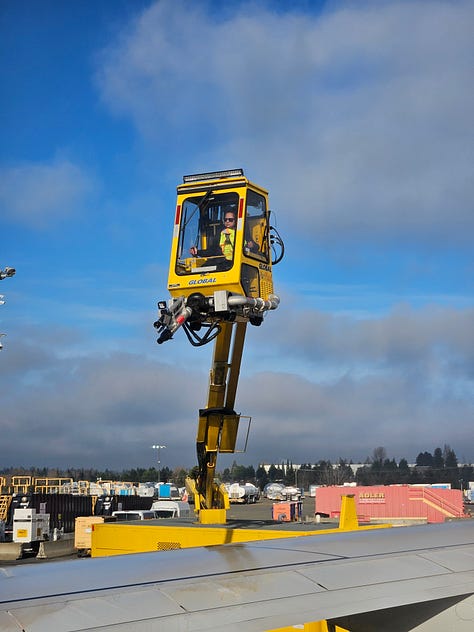
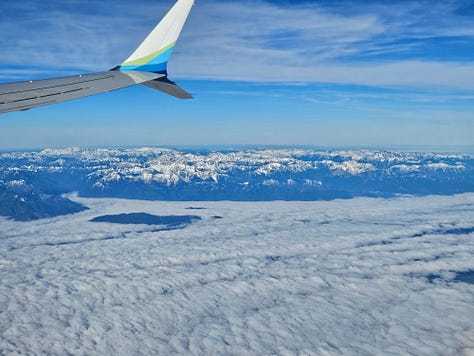
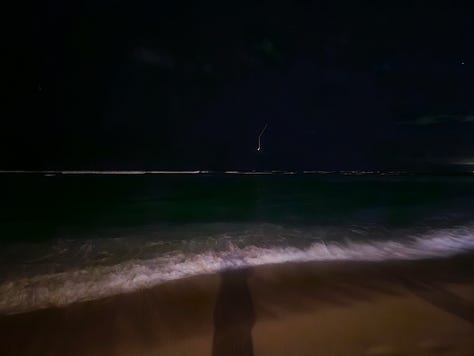
Biosecurity to prevent invasive species and pathogens from entry is a big deal in New Zealand, and not just for the more obvious things like plants and animals, but for items that have been in water. Brenda has a wetsuit, and l a mask and snorkel. We've washed them in clean water in accordance with instructions, but declare them anyway, earning gratitude from the inspector.
An international date Iine miscalculation (#4) has us spending two nights in an airport hotel in Auckland, so we get to spend a day downtown. With help from ever friendly locals, we find a vegan lunch in the Ponsonby district, then head down to the waterfront of this maritime city, where we find cruise ships, car carriers, ferries, sailboats, America's Cup boats, and luxury yachts. Friday happy hour in Auckland seems to start at lunch time and keep going. We run into a triathlete couple we know from home. While we're having a drink and chatting, the sun finally makes an appearance and catches me without hat or sunscreen. Now I really look like a tourist.
New Zealand is starting to warm our hearts. The people are wonderful and helpful. We're struck by the cleanliness, the lack of litter and the rarity of smoking. We stock up on groceries at a local PAK'nSAVE, a discount grocery chain. We find the quality of fresh fruits and vegetables surpasses anything at home, while the prices are much lower.
We finally hit the road. For our journey south, we choose State Highway 27, which passes through the dairy farming Matamata-Piako District, which is also home to Hobbiton, site of the Lord of the Rings movie sets. A water restriction sign reminds me that water issues don't so much follow me as lie in wait to ambush me whenever I go. Just as in my home state of Washington's Nooksack and Yakima Valleys, dairy farming in New Zealand is causing water shortages and aquifer and surface water contamination. For more on the environmental impact of New Zealand's animal agriculture, read Creating a stink: part two - by Melanie Newfield.
With perfect timing, my guest essay for Julie Gabrielli's Reciprocity series arrives in your inbox on the day that we arrive at our first proper destination, a cabin in the woods. This award-winning eco-cabin features window walls that present nature outside, with silver ferns and so many birds, as if it were a diorama. It's human vanity to see it so; the truth is that in this diorama, nature is the observer, and we the exhibit.
An outdoor tub lures us out from behind the glass to become one with our audience, the nature around us.
The abundant water here is from Hamurana Springs which flow into Lake Rotorua, a caldera, or crater lake, a few minutes’ walk away, and where a path takes us along the shore. In a fitting coda to 2024, a whole flock of Black Swans is feeding on the lake.
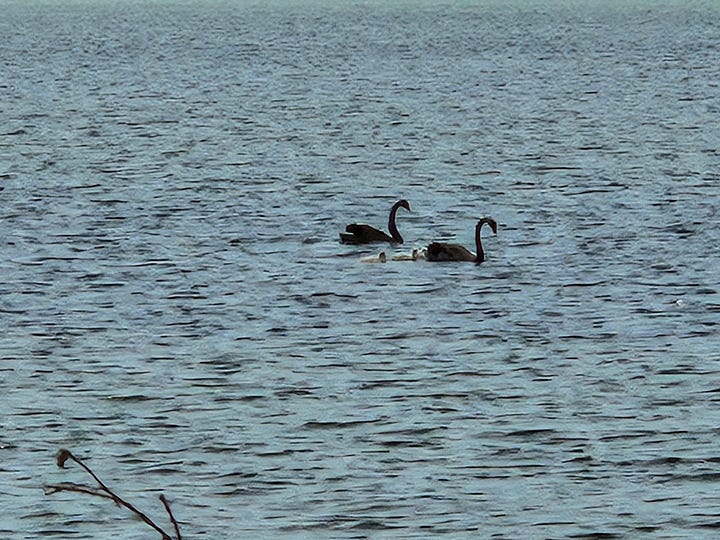
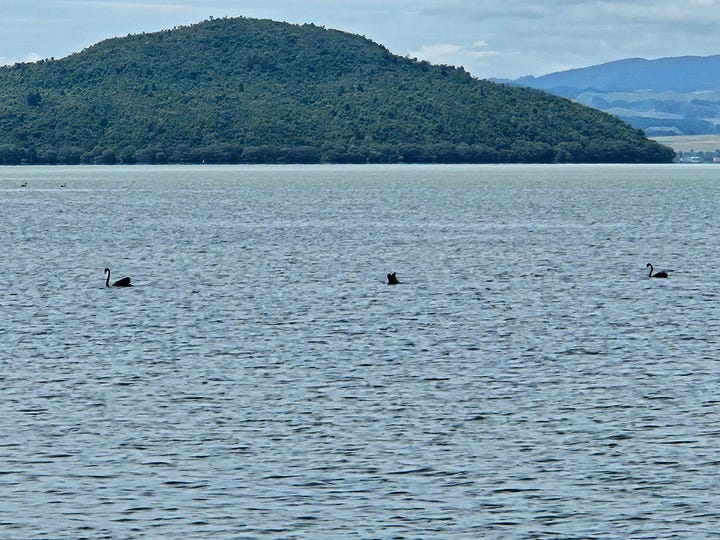
New Zealand lay undiscovered, untouched, and unowned by humankind until around 700 years ago. As we observe the non-native conifer plantations, clear cuts, and roadside Scotch broom, all reminiscent of the Pacific Northwest, on the way to Wai-O-Tapu thermal park, it's hard to escape the feeling that ownership has not been wholly beneficial. We're heading to see what for both of us will be our first geyser. Check. The park also features geothermal pools with hot water, steam, and minerals from crude oil to sulfur to mercury, silver, and gold.
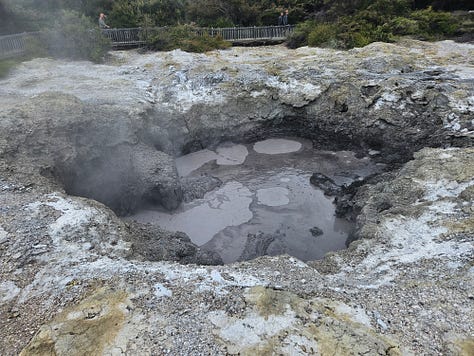
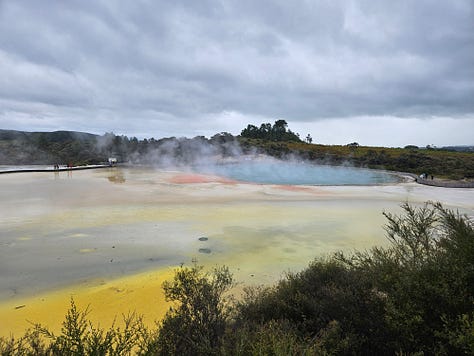
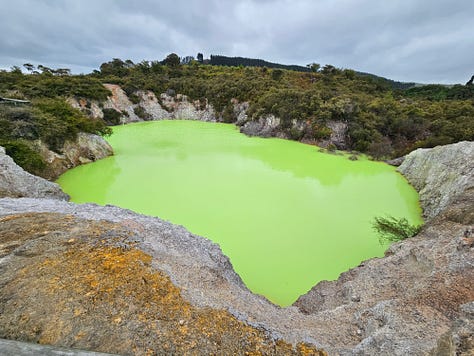
The three days we've spent in the cabin in the woods have felt like a personal retreat, the restorative we didn't know we needed after three days of travel and a hard year. Now we're back on the road, heading down to Taupō for the race. Our accommodation there could hardly be more different. It was already all that was available when we started trip planning months ago. It's a budget hotel with shared bathrooms and a shared kitchen and reminds us of a student dorm. We're here a week, and it will be just fine. Taupō is resort town on the north end of Lake Taupō. It's another caldera, in the crater of a giant super volcano, 800 years overdue for its next eruption. Fingers crossed it’s not this week.
The town's already filling up with the four thousand triathletes and their camp followers for the weekend's Ironman 70.3 World Championships. I'll be back next week with a full race report and more on Taupō. For now, I'll leave you with this view down the lake over the practice swimmers and the crystal-clear water to the volcanos Mounts Ruapehu, Ngauruhoe, and Tongariro.
Thanks, as always, for reading. Follow the links to find more of my writing on travel and triathlons through the lens of water. To make sure you don’t miss next week’s post, and further dispatches from New Zealand, please consider subscribing.


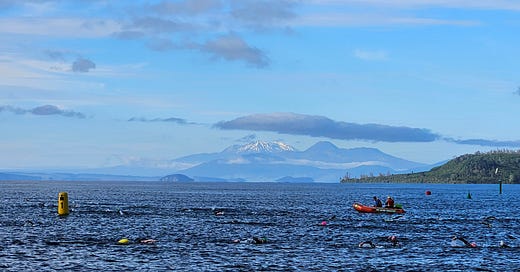


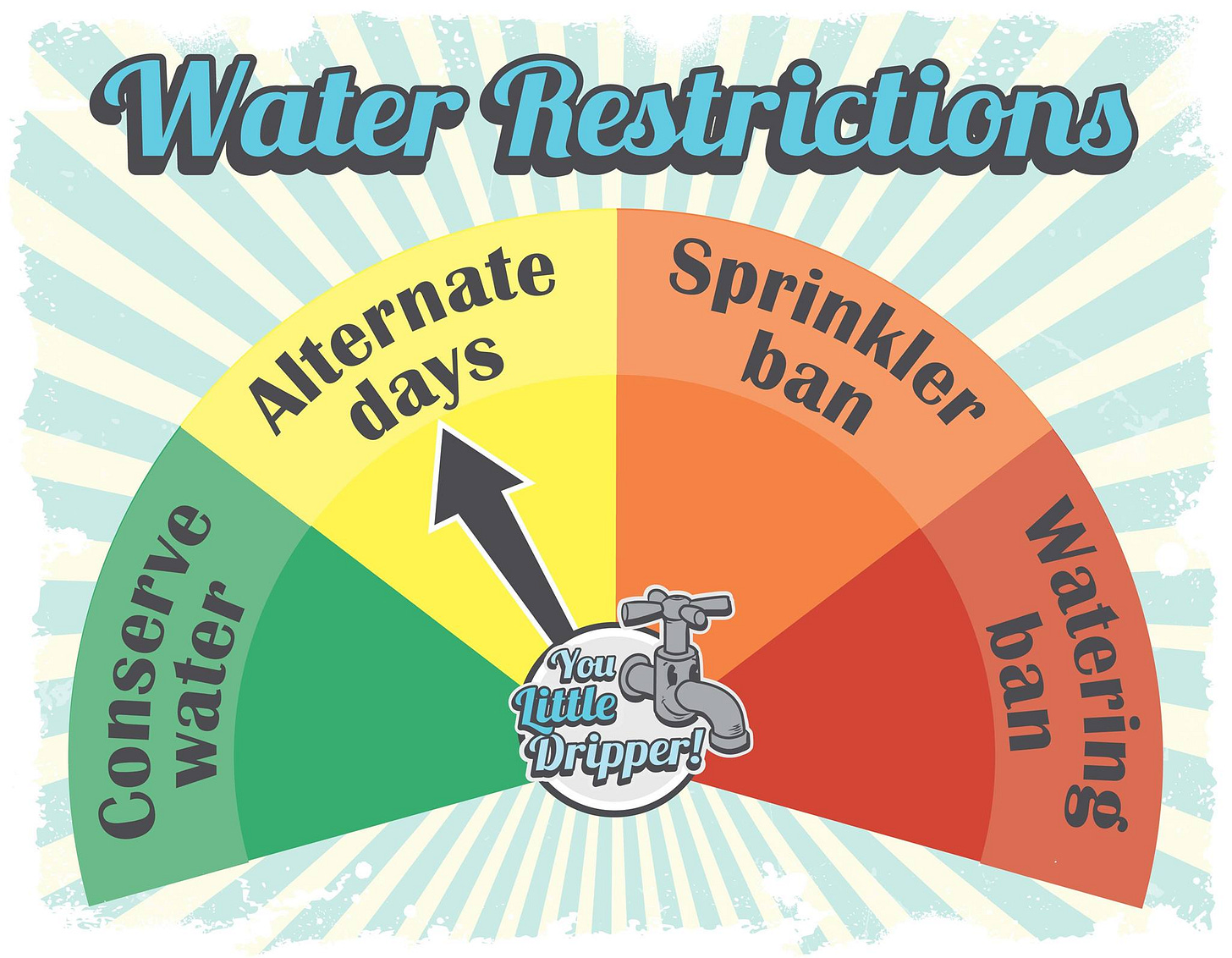
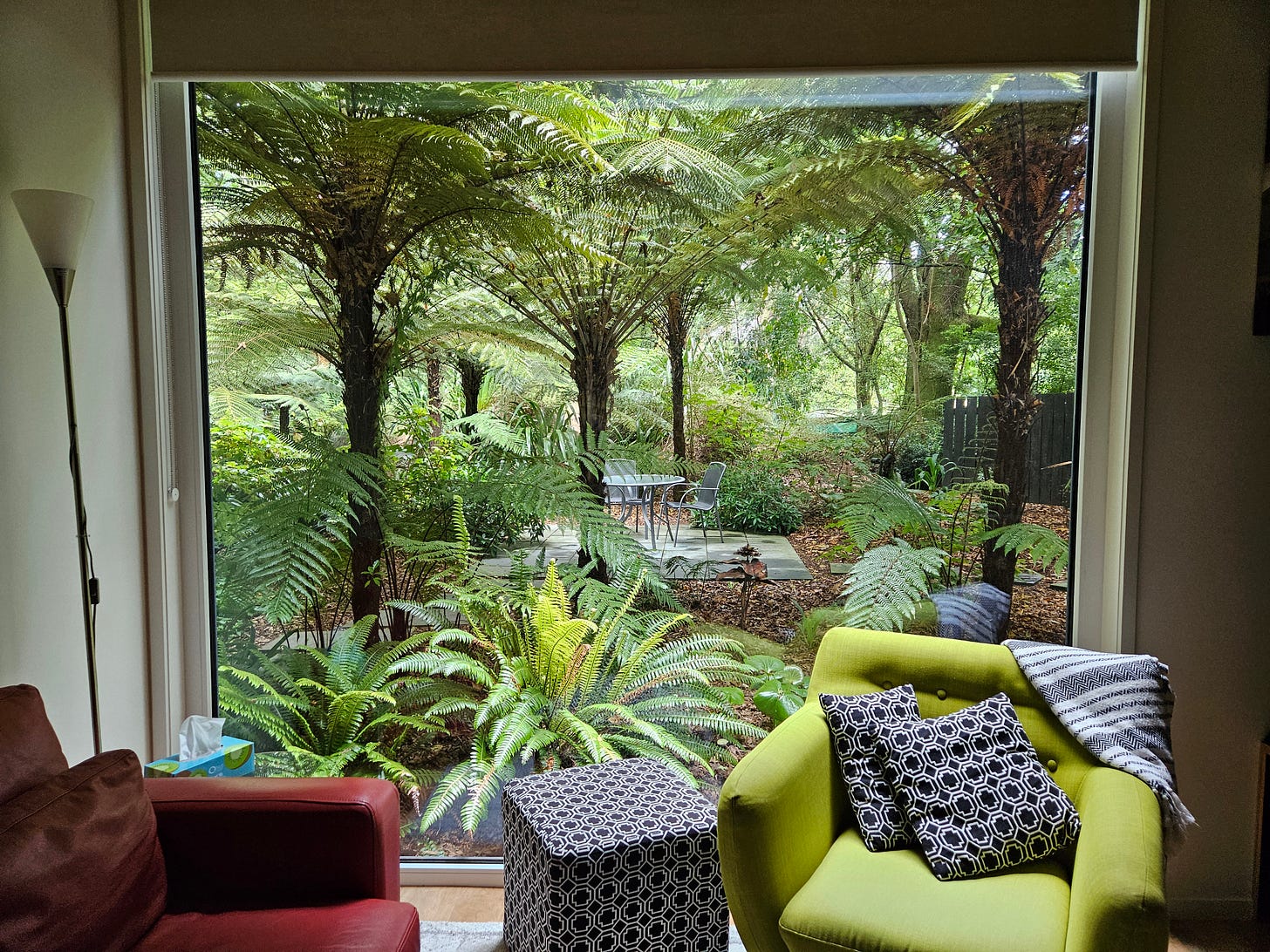
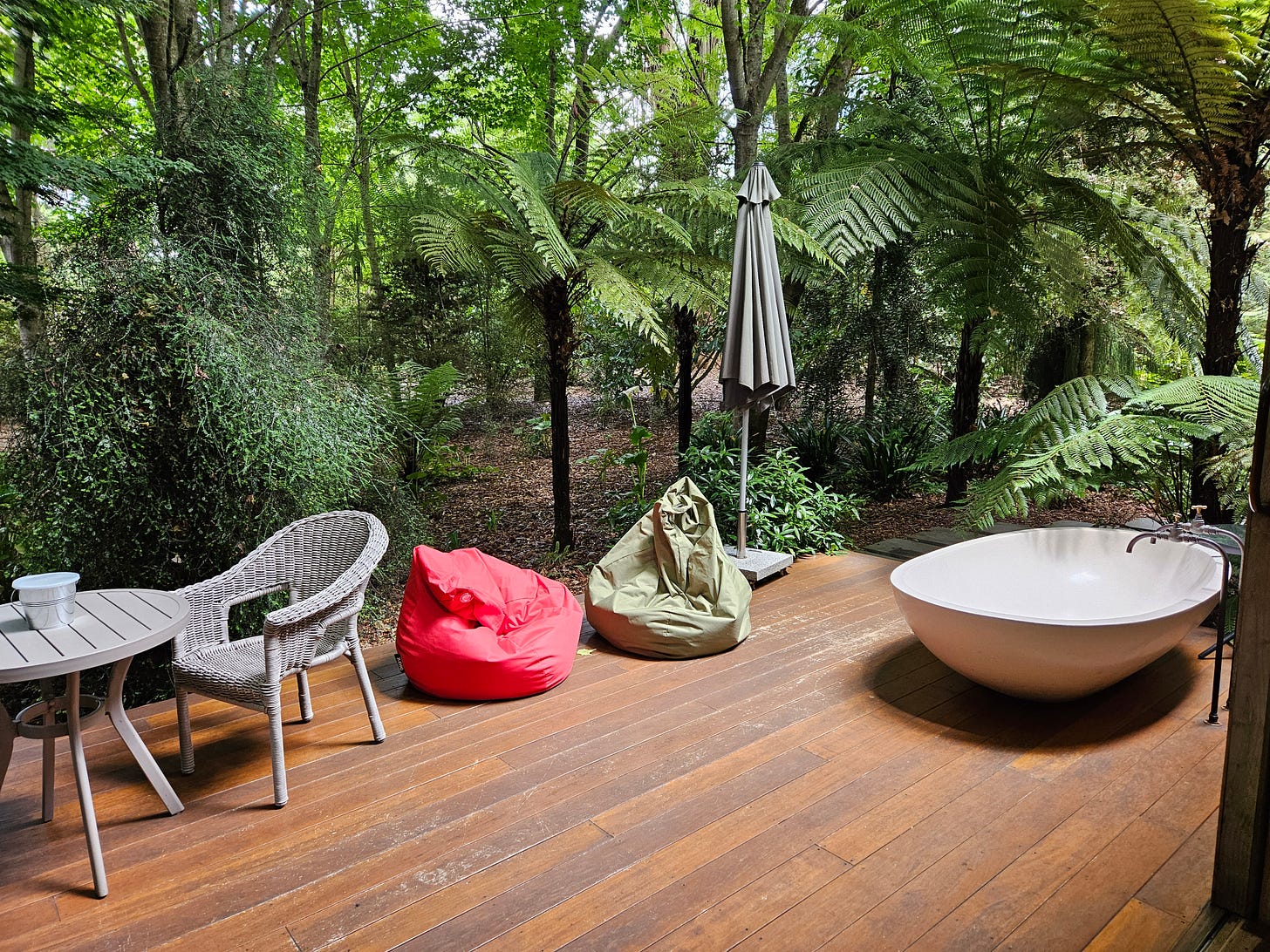

It’s wonderful to see home talked about so fondly! Hope you’re coming to see the South Island where we really show off our country’s grandeur. ;)
What a delight to find you writing about water from afar. Also, I had no idea. New Zealand was so new to humans. It’s kind of hard to grasp. And I love knowing this. Thank you. :)